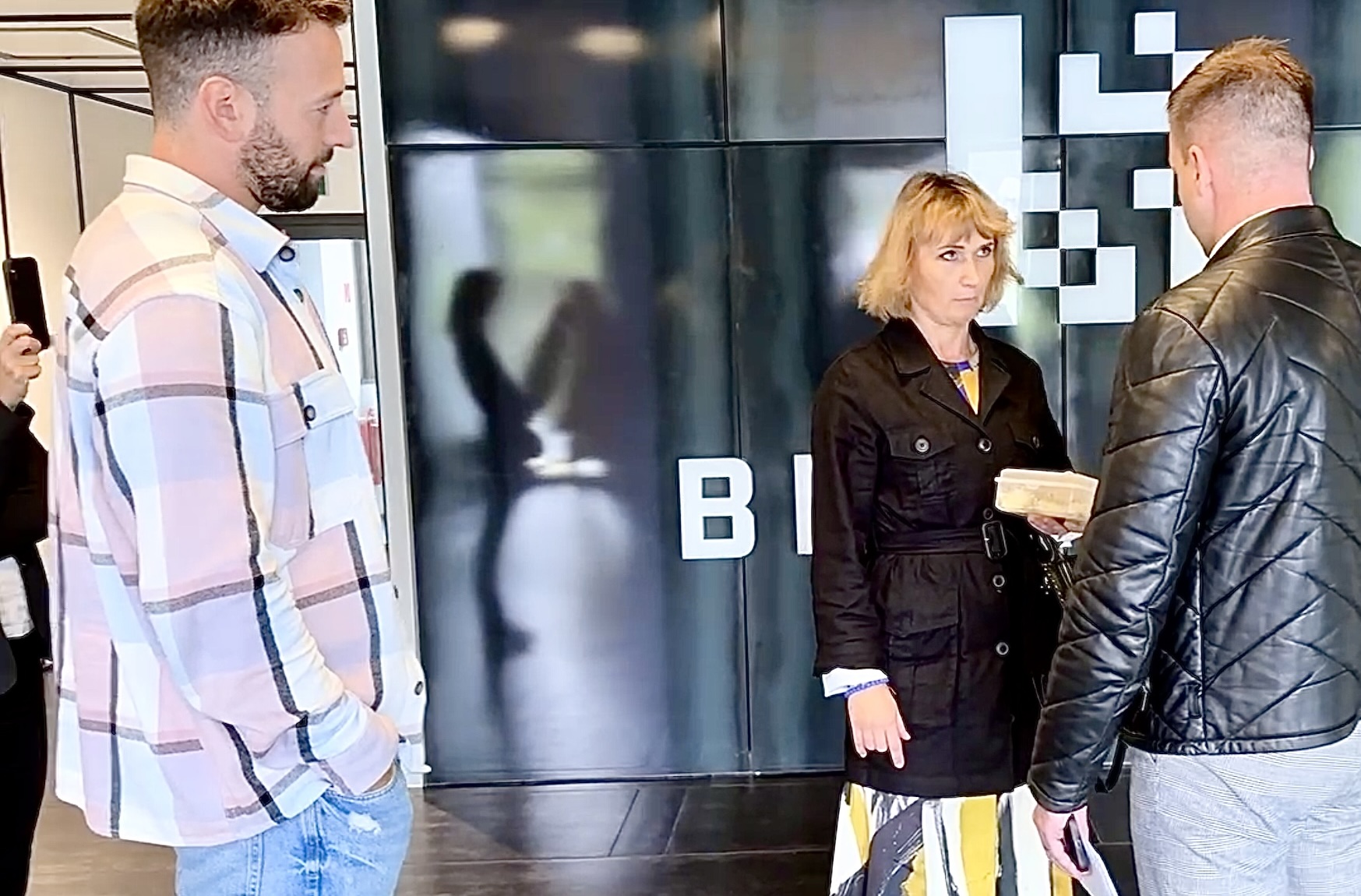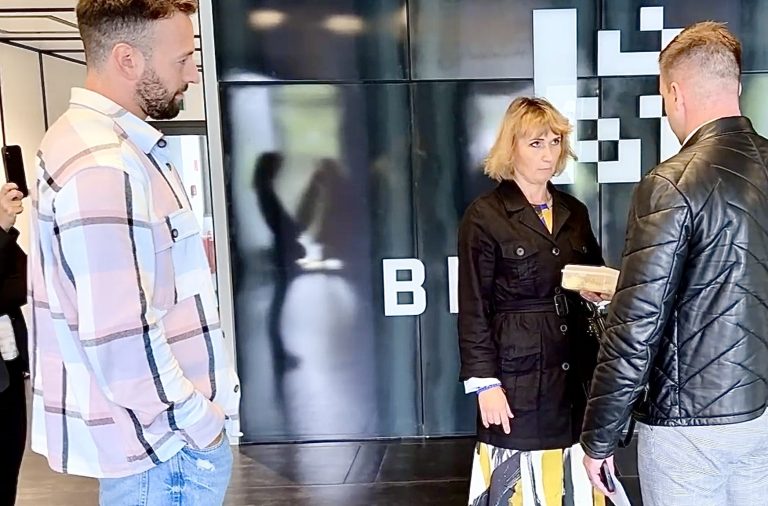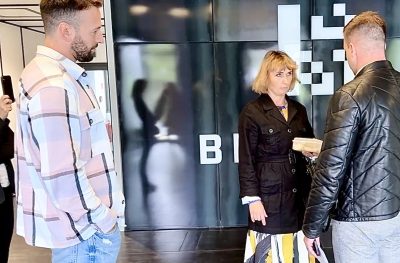Photo: Juraj Gedra's Facebook page 2024-11-20
Photo: Juraj Gedra's Facebook page 2024-11-20
Slovak journalist Xénia Makarová faced attacks from government officials and the ruling party as a result of her work. Juraj Gedra, head of the Government Office, shared a selectively edited video on social media to discredit her and the findings, which was amplified by Smer party supporters and paid Facebook ads, raising concerns about press freedom and transparency in Slovakia.
Slovak journalist Xénia Makarová faced attacks from government officials and the ruling party as a result of her work. Juraj Gedra, head of the Government Office, shared a selectively edited video on social media to discredit her and the findings, which was amplified by Smer party supporters and paid Facebook ads, raising concerns about press freedom and transparency in Slovakia.
In early October, investigative journalist Xénia Makarová became the target of attacks from Slovak government officials. The Stop Corruption Foundation (Nadácia Zastavme korupciu), in collaboration with the Investigative Center of Ján Kuciak (ICJK), published an investigation into the bidding process for the reconstruction of the Government Office compound in Bratislava. The successful bid was submitted by a company led by a businessman associated with oligarch Norbert Bödör. The involvement of individuals linked to figures previously accused of corruption might raise questions about the transparency and oversight of public procurement in Slovakia.
Juraj Gedra, head of the Government Office, personally confronted Makarová, who co-authored the report. Gedra then used a selectively edited video, which was posted to and spread on social media, to cast doubt on the journalist’s credibility and the investigation’s findings. Our analysis indicates that the video distorting the attack by the politician was then amplified by hundreds of his supporters and fans of the ruling Smer party, which repeatedly paid for Facebook ads promoting the post.
The Stop Corruption Foundation has several objectives, including fighting corruption by exposing and monitoring corruption cases, promoting transparency in the public sector, and organizing campaigns to raise awareness of corrupt practices and their impact on society. In this instance, they published an investigative article in collaboration with ISJK, which is to say that the attack on this report and Makarová was an attack on a journalist and on journalism.
On Thursday, October 3, shortly after 11am, the Government Office’s head, Juraj Gedra, arrived unannounced at the Stop Corruption Foundation’s headquarters. He was accompanied by Erik Kaliňák, a member of the European Parliament. Earlier that same day, the Foundation and ICJK had published an investigative article about a €5 million contract for the renovation of the Government Office compound. At the Foundation’s reception desk, Gedra requested a meeting with Xénia Makarová, co-author of the article. She came out to speak with him. Instead of a routine conversation, however, she was met with something unexpected.

Still from the video of Juraj Gedra attacking Xenia Makarova. Source: Juraj Gedra’s Facebook page
“It struck me as odd that he arrived without prior notice, unexpectedly, in the middle of a workday. I would assume that someone in Juraj Gedra’s position, as well as someone in Erik Kaliňák’s role — not only a Member of the European Parliament but also head of the Prime Minister’s advisory board — would have a full work schedule,” said Makarová, who realized shortly after arriving downstairs that Smer MEP Kaliňák intended to record the conversation on video. (Erik Kaliňák is the nephew of Robert Kaliňák, deputy prime minister of Slovakia and minister of defense. The elder Kaliňák was also interior minister in the previous Fico administration, during which time he was questioned for his connections to a businessman suspected of tax fraud. Kaliňák resigned after the 2018 murder of investigative journalist Jan Kuciak, for whom the ICJK is named.)
From the outset of the meeting, Gedra bombarded the investigative journalist with questions about alleged inaccuracies in the article on the Government Office renovation. He repeatedly attempted to undermine Makarová’s work, accusing her of inaccuracies and manipulation, while, as can be seen on the video, frequently interrupting her whenever she attempted to respond to his accusations. “I don’t know what their goal was — I can’t see into their minds — but it’s clear that, given there has been no request for a correction so far, their intent wasn’t to point out any actual error in the article but rather to produce a video for social media,” Makarová said.
The meeting lasted around nine minutes. Later that day, a five-minute edited video appeared on Gedra’s Facebook page, as well as the official Facebook and YouTube profiles of the Smer political party. Gedra edited the video, adding his own commentary to frame the situation in his favor, and included a post claiming that “liberal media will back even the dirtiest tricks, but we won’t tolerate this anymore.”
The posts triggered an extensive campaign targeting Makarová. “This incident illustrates how Facebook and YouTube can be used to rapidly spread manipulative content. Government representatives initiated this confrontation to produce viral video content, adopting an aggressive stance and disseminating their edited video with manipulative labels. They derogatorily labeled foundation employees as ‘progressive NGOs’ and disparaged their work as a ‘dirty political campaign,’” said information security expert Tomáš Kriššák.
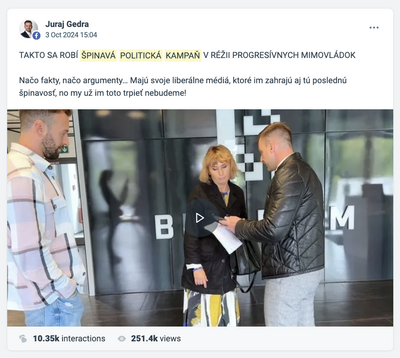
Facebook post by Juraj Gedra. Source: Gerulata/Juno
We reached out to Juraj Gedra via the Government Office press department, but received no response by our deadline.
Politicians used similar methods to incite hate campaigns against journalists in other, earlier cases, as seen with moderator Marta Jančkárová and the attacks sparked by Smer politician Ľuboš Blaha.
Wave of Hatred Against Journalist
The Investigative Center of Ján Kuciak analyzed Facebook comments under the video posted by the head of the Government Office. Out of nearly 1,400 comments under the video shared by Gedra and the SMER party, 60.8 percent were negative, 38 percent were neutral, and only 1.2 percent supported the article’s author.
Almost half of the comments (48.7 percent) included personal attacks against Xénia Makarová, journalists, or the Stop Corruption Foundation. Additionally, 7.6 percent of the comments contained direct or indirect threats.
As seen in previous cases of attacks on journalists, the analysis of the campaign against Xénia Makarová shows how quickly hateful content, published by public figures on far-reaching profiles, can spread and incite further vitriol. In an interview with the ICJK, Makarová acknowledged that the campaign led to an increase in threatening messages and noted that this was not the first time government officials have targeted journalistic findings in such a manner. Still, “This is neither standard nor acceptable,” she said.
Documents like the European Media Freedom Act and the European Commission’s Recommendation on the Protection, Safety and Empowerment of Journalists clearly state that attacks on journalists and interference with their work are unacceptable and undermine the fundamental democratic principles of freedom of expression and the right to information.
Social Media Amplifies Reach of Attack
On October 3 at 3:04pm, Gedra posted the video to his Facebook page, where he has over 8,000 followers. Simultaneously, the video appeared on Smer’s YouTube page, which has more than 93,000 followers. Within minutes, the video was also shared on Smer’s Telegram channel (14,200 followers), as well as its Facebook (164,000 followers), TikTok (67,000 followers), and Instagram (14,800 followers) accounts. On Facebook alone, the video has over 1,800 shares (as of November 6, 2024).
Gedra’s video, along with its accompanying text, was shared by various disinformation sources, including the channels Blog of Investigative Journalism, Slovak News, Infokanál Club of Unconventional Thinkers, Online Here and Now, and CZ24.NEWS. These channels do not limit what they publish to verified information and regularly report uncritically on certain political entities.
In the initial two days following the incident (October 3–5, 2024), posts quoting or referencing Gedra’s term “dirty political campaign” appeared 54 times across social media platforms. These were not 54 cases of simply sharing the video; rather, these posts took Gedra’s language and expanded on it, using his phrase to further target the author of the investigative piece on the Government Office’s renovation. Collectively, these posts garnered over 570,000 views within two days.

Source: Gerulata/Juno
The dissemination of Juraj Gedra’s narrative and his edited video attacking Xénia Makarová were most effectively carried out through the Facebook pages of Smer and that of Gedra himself. However, the video and accompanying text also spread via other well-known disinformation channels, including the Telegram account of disinformation spreader and antisemite Daniel Bombic, also known as Danny Kollár, who has 26,800 followers, and Mimi Šramová, assistant to SNS MP Ivan Ševčík, with 26,600 followers.
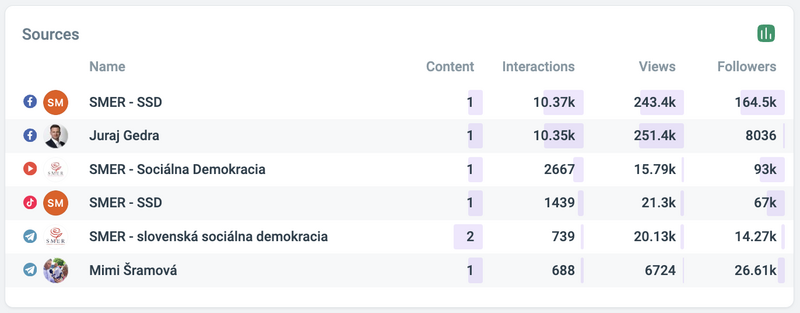
Source: Gerulata/Juno
Paid Ads Amplify Hate Video’s Reach, Fueling Further Attacks
Juraj Gedra and the Smer party amplified the reach of the edited video attacking journalist Xénia Makarová by purchasing Facebook advertisements. According to Facebook’s Ad Library (a publicly accessible tool which provides transparency into ads running across Facebook, Instagram, and related platforms, allowing users to view details like funding, spending, content and demographic reach), they ran two separate ad campaigns:
- First Campaign (October 3–6):
- Budget: €200–€299
- Estimated Audience: Over 1 million accounts
- Impressions: 150,000–175,000
- Second Campaign (October 5–7):
- Budget: €100–€199
- Estimated Audience: 100,000–500,000 accounts
- Impressions: 45,000–50,000
By investing a total of €300–€500, the party ensured that the attack on the journalist reached hundreds of thousands of people.
Thanks to paid ads, the hateful video against Makarová spread more widely, triggering additional attacks. Expert Tomáš Kriššák emphasized that “paid advertising amplifies the reach of disinformation campaigns, enabling precise targeting of specific user groups based on demographics and interests. This allows manipulators to deliver their messages directly to the segments most susceptible to such manipulation, significantly increasing campaign effectiveness. Tools like ads enable manipulators to create the illusion of broader support or threat, greatly shaping public perception.”

Paid advertisement data for the video on Juraj Gedra’s page. Source: Facebook/Ad Library
Following the campaign, both Xénia Makarová and the Stop Corruption Foundation received increased threats. On October 7, the Foundation filed a criminal complaint, having received threats including hanging, live dismemberment, and other violent threats. According to Makarová, the General Prosecutor’s Office forwarded the complaint to the regional level, which subsequently passed it to the district level for handling by the Bratislava – Karlova Ves police department.
Through the Safe Journalism platform, operated by ICJK, the incident was reported to the international Monitoring System for Attacks on Journalists (MFRR) and the International Press Institute. The Council of Europe’s Journalist Protection Platform was also informed.
Political attacks on journalists present a unique challenge, as the media has limited means to defend against them: the politicians, in making the attacks, are discrediting not only individual journalists, but also the media more generally, meaning anyone who speaks up in defense is suspected by those sympathetic to the politicians. Furthermore, politicians’ reach on social media, often enhanced by paid ads, allows these attacks to reach a vast audience, often followed by user comments containing insults or violent threats.
Despite the backlash, Makarová received notable support. “To my surprise, I received tremendous support from fellow journalists, collaborators, and the public. People showed support by liking posts and articles about the confrontation, which were widely read, and we received significant financial contributions, for which we are very grateful,” Makarová said.
The article was originally published on ICJK.sk.
Subscribe to “Goulash”, our newsletter with original scoops and the best investigative journalism from Central Europe, written by Szabolcs Panyi. Get it in your inbox every second Thursday!

